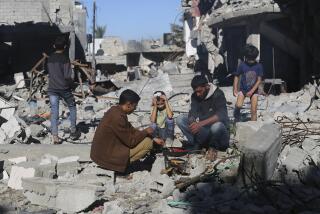Contras Delay Talks for 6 Days on Disarming Troops : Each Side in Nicaragua Accuses the Other of Breaking Agreements Made in Sapoa
- Share via
MANAGUA, Nicaragua — Amid mutual recriminations, Contra leaders have postponed for 6 days talks with the Sandinista government on disarming rebel troops, dealing Nicaragua’s preliminary peace accord its second setback in as many weeks.
In statements Saturday and Sunday, each side accused the other of breaking agreements made March 23 in Sapoa, Nicaragua.
Rebel leaders said the government has ignored their requests to free imprisoned Contras and has silenced the opposition newspaper La Prensa by withholding newsprint. Sandinista officials accused the rebels of balking at follow-up negotiations.
Cardinal Miguel Obando y Bravo, who is monitoring the accord, said Sunday that the dispute “is sad for our people.” He took no sides but urged Nicaraguans to pray “that this (peace) effort does not go to ruin.”
“What could torpedo the peace here is a lack of political will by the government or the resistance,” the Roman Catholic leader said in his Easter homily. “I have much hope that wisdom and good sense will prevail.”
Only Minor Attacks
Both sides agreed that except for a few minor attacks, an informal truce has held on the battlefield since March 21, the first day of the talks that led to the Sapoa agreement to end 6 years of fighting.
“It could be that there is no war,” Obando said. “But this does not mean there is peace. We want an authentic peace in which there is justice, love and well-being for all Nicaraguans.”
The Sapoa accord called for two sets of follow-up negotiations. By April 1, military delegations were to have fixed cease-fire zones and written rules for separating the two armies for a formal 60-day cease-fire. Then, political leaders were to meet in Managua starting this Wednesday to negotiate a definitive cease-fire, including political terms for disarming the rebels.
Meanwhile, the government agreed to guarantee “unrestricted press freedom” and start freeing about 3,300 anti-Sandinista prisoners. The first 100 prisoners were released a week ago.
Time to Explain
Last Tuesday, Contra military commanders broke off talks in Sapoa after mapping five of the seven cease-fire zones. They said they needed more time to explain the process to their troops. Those technical talks were postponed until this Tuesday, delaying the start of the formal cease-fire.
The latest dispute arose when rebel political leaders asked to delay the political talks. When the government replied that this would be “counterproductive,” the rebels Saturday declared a unilateral 6-day postponement of the talks.
Needs More Time
In a statement, the Nicaraguan Resistance, as the rebel coalition is called, said it needs more time to finish the technical talks and gather its troops in the cease-fire zone before the political talks opened.
It said that a 55-member rebel delegation will be ready to start the political talks in Managua on April 12.
However, the statement added, the climate for such talks “has not been helped” by two government actions.
First, rebel leaders said they sent a list of 100 Contra combatants and collaborators they wanted freed in the initial prisoner release on Palm Sunday. They said the government freed only 11 of those on the list.
The rebels also accused the government of forcing La Prensa, the country’s only anti-Sandinista newspaper, to close last week by refusing to replenish its dwindling newsprint stocks, while two pro-government papers continued publishing. The government controls all distribution of newsprint, which comes from the Soviet Union.
It was the first time La Prensa has suspended publication since the government allowed it to reopen last Oct. 1.
“We cannot continue this peace process while the Sandinistas comply only halfway with their commitment,” Bosco Matamoros, a rebel spokesman, said in a telephone interview Sunday.
Unconditional Return
But he acknowledged that the main reason for delaying the talks is to give the rebels more time to prepare. He said they would come to Managua next week without preconditions.
A government official said Sunday that the Contras’ prisoner list came one day before the release, too late to be considered.
The official also said that La Prensa had used up its allotment of scarce newsprint faster than the other papers. Editors of La Prensa said Sunday that this is true, but they accused the government newspaper Barricada of reneging, temporarily, on an emergency sharing agreement.
In any case, the editors said, La Prensa plans to resume publication today.
The government dismissed the Contras’ complaints as pretext to stall efforts to achieve a definitive cease-fire.
“We view with great concern the fact that the Nicaraguan Resistance has adopted a habit of systematic non-compliance with the peace agreement,” the Nicaraguan Foreign Ministry said in a statement Saturday.
“The Contras are caving in to pressure from the Reagan Administration,” a Sandinista official said Sunday. “The Administration was not able to stop the agreement, so it is trying to sabotage it with procrastination.”
More to Read
Sign up for Essential California
The most important California stories and recommendations in your inbox every morning.
You may occasionally receive promotional content from the Los Angeles Times.










